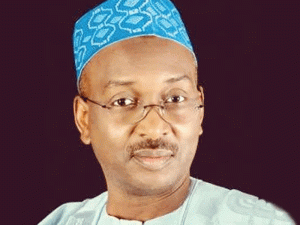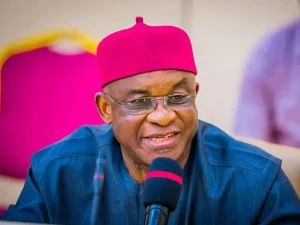POLITICS
Lukman Warns Against Leadership Imposition, Godfatherism

Salihu Mohammed Lukman, a prominent figure in Nigeria’s opposition coalition, has raised concerns over what he describes as early signs of political manipulation within the African Democratic Congress (ADC).


The proposed legislation, currently before the National Assembly, aims to amend existing structures governing the NCTRN. At the heart of the bill is the clause that seeks to establish the Sultan of Sokoto and the Ooni of Ife as permanent chairmen, effectively giving them lifetime leadership positions within the council.
Supporters of the bill argue that both traditional rulers hold significant historical and cultural importance, making them symbolic unifiers of Nigeria’s diverse traditional institutions. However, critics, particularly from the South-East and South-South regions, view the proposal as a move that undermines the equality of traditional rulers across Nigeria.
In a strongly worded statement, Ohanaeze Ndigbo rejected the bill, insisting that it is a direct affront to Nigeria’s federal character principles. The organization argued that every ethnic group has revered monarchs whose authority and influence cannot be downplayed. According to the group, singling out the Sultan and the Ooni for permanent leadership positions institutionalizes inequality and risks deepening ethnic divisions in the country.
An Ohanaeze spokesperson was quoted as saying: “Nigeria is a federation with multiple cultures and traditional institutions. To impose two monarchs as permanent chairmen is an insult to other revered rulers such as the Obi of Onitsha, the Oba of Benin, the Shehu of Borno, and many others whose histories are equally rich and respected.”
The National Council of Traditional Rulers was created to provide a platform where royal fathers across the six geopolitical zones could collaborate, advise the government, and preserve cultural heritage. Traditionally, its leadership is rotational, ensuring fairness and inclusivity among Nigeria’s diverse monarchies.
By introducing permanency into its leadership, critics argue that the council risks losing legitimacy, as it would favor specific regions and religions over others. This, according to Ohanaeze, contradicts the very spirit upon which the council was founded.
The controversy is not just about titles; it reflects deeper issues of representation, fairness, and Nigeria’s struggle with balancing its ethnic and cultural diversity. For many groups, particularly in the South-East, the bill appears to be another example of structural marginalization.
Analysts also note that traditional rulers, though without constitutional powers, wield immense influence at the grassroots level. They often play critical roles in conflict resolution, community mobilization, and national unity. As such, institutionalizing leadership in favor of just two monarchs could distort Nigeria’s delicate balance of cultural authority.
The rejection of the bill by Ohanaeze has triggered similar sentiments across other ethnic groups. Some leaders in the South-South and Middle Belt have also expressed reservations, noting that their monarchs are equally qualified to serve as chairmen of the council.
However, in Northern Nigeria, some traditional institutions have shown support for the proposal, emphasizing the historical role of the Sultan of Sokoto as the spiritual leader of Nigerian Muslims. Similarly, supporters of the Ooni of Ife argue that the monarch represents Yoruba unity and heritage, making his inclusion as a permanent chairman symbolic of cultural continuity.
Despite these arguments, many Nigerians remain wary of the potential consequences of granting such privileges permanently to only two figures.
Ohanaeze and other groups have called for inclusivity in decision-making concerning the NCTRN. They propose that leadership should remain rotational and equitable, reflecting Nigeria’s six geopolitical zones. This, they argue, would ensure that every region feels represented, thereby strengthening national unity.
One suggestion gaining traction is the establishment of a rotational system where chairmanship alternates among zones every two or three years. This would prevent monopoly of power and promote a sense of belonging among Nigeria’s diverse traditional rulers.
If the bill is passed into law, it could significantly alter the dynamics of traditional authority in Nigeria. Some fear that it might trigger discontent and further alienation of minority groups. This, in turn, could exacerbate existing ethnic tensions, especially in regions already sensitive to perceived political and cultural marginalization.
Critics also warn that the bill may set a dangerous precedent where the federal government is seen as favoring specific ethnic or religious groups over others. In a multi-ethnic country like Nigeria, such favoritism could destabilize the fragile balance holding the nation together.
On social media platforms, Nigerians have been vocal about the issue. Many young people in particular view the bill as outdated and irrelevant to the country’s pressing challenges such as insecurity, unemployment, and economic hardship. For them, the focus should be on empowering traditional rulers to contribute meaningfully to community development rather than on titles and privileges.
Others, however, see the bill as a harmless cultural recognition of the Sultan and Ooni, arguing that their symbolic roles transcend politics. Still, the overwhelming reaction has been one of skepticism and opposition, particularly from regions outside the North and South-West.
To resolve the growing tension, stakeholders have urged the National Assembly to reconsider the bill and engage in wide consultations with traditional institutions from all parts of Nigeria. Ohanaeze has also called on lawmakers of Igbo extraction to stand firmly against the bill and ensure that equity is preserved within the council’s leadership structure.
Analysts believe that the most sustainable solution lies in reinforcing inclusivity rather than creating permanent hierarchies. By maintaining a rotational leadership model, the council can continue to serve as a unifying body rather than a divisive one.
The proposed bill to make the Sultan of Sokoto and the Ooni of Ife permanent chairmen of the National Council of Traditional Rulers has sparked one of the most heated debates in recent times. While supporters argue that both monarchs carry historical and cultural weight, opponents led by Ohanaeze Ndigbo insist that such a move undermines equality and risks deepening divisions in Nigeria.
As the bill awaits further deliberation in the National Assembly, the question remains whether lawmakers will prioritize inclusivity and unity or push forward with a proposal that could alter Nigeria’s traditional power dynamics for decades to come.

